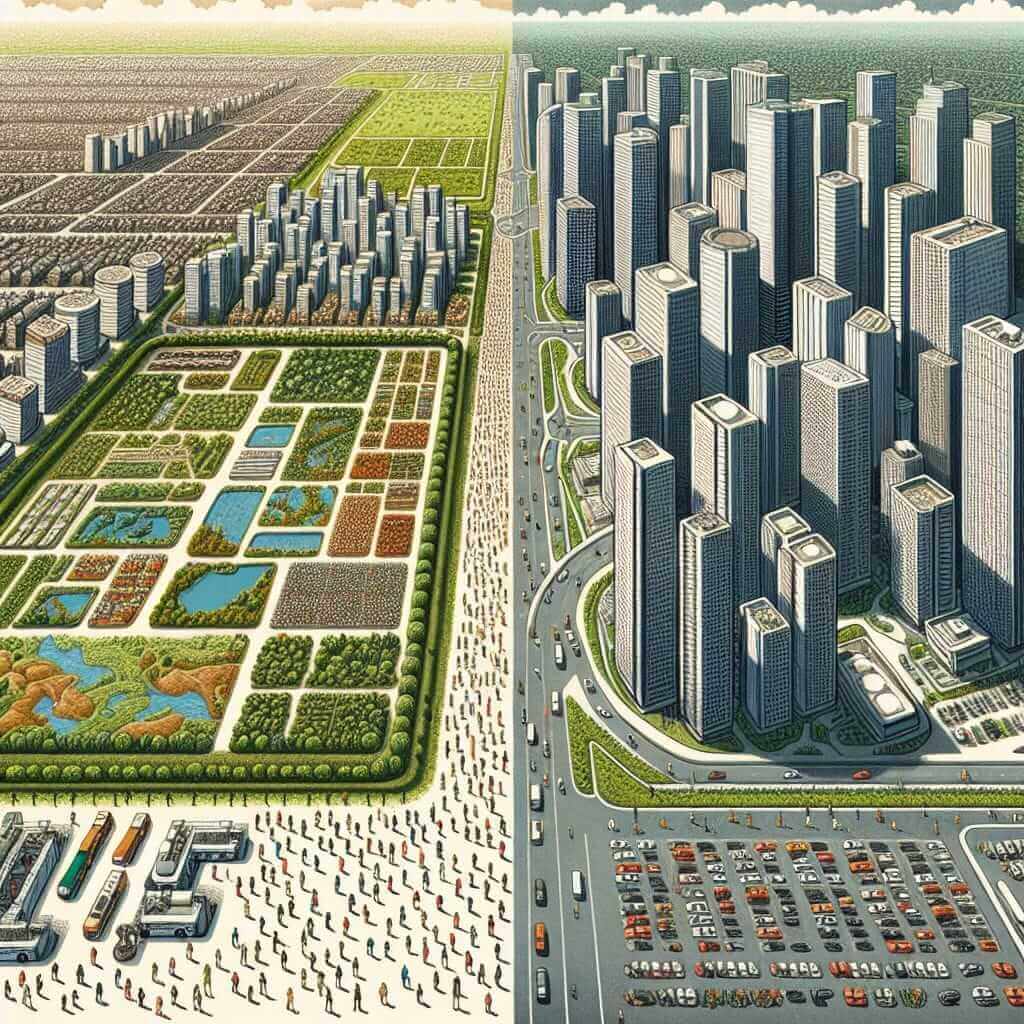Urban planning profoundly influences the quality of life in our rapidly growing cities. This topic has been repeatedly featured in IELTS Writing Task 2, showcasing its continued relevance. In this article, we will understand the intricacies of this critical subject and develop a comprehensive essay, optimized for SEO and structured to help IELT students achieve high band scores.
The Recurrence of Urban Planning in Past IELTS Tests
Issues related to urban planning commonly appear in IELTS Writing Task 2. Various past paper analyses indicate significant instances where the candidates had to discuss the effects of city planning measures on different aspects of life.
Sample Essay Prompts from Past Exams
- “Some people believe that urban planning should prioritize convenience and efficiency, while others assert that it should focus on environmental sustainability. Discuss both views and give your opinion.”
- “City planners want to create a new community park in your town. Discuss the advantages and disadvantages this might bring for quality of life.”
Based on these samples, we’ll choose one closely reflecting our target topic for deeper exploration.
Selected Essay Prompt
“Many cities today are expanding upwards, building taller skyscrapers, while others are choosing to expand outwards into the countryside. Discuss both views and give your opinion on how urban planning should be approached to enhance the quality of life.”
Analyzing the Prompt
The prompt asks us to discuss two contrasting views on urban expansion — vertical and horizontal growth. These viewpoints offer different potential impacts on the quality of life. The task requires us to:
- Discuss both views: Detailing the benefits and drawbacks of vertical (upwards) and horizontal (outwards) urban expansion.
- Provide an opinion: Offer a reasoned standpoint on which approach better enhances the quality of life.
Sample Essay
Urban planning is pivotal in shaping the dynamics of city life. With increasing urban populations, cities must decide whether to expand upwards with towering skyscrapers or horizontally into suburban and rural areas. Each approach has significant implications for the quality of life.
Vertical expansion, characterized by building taller structures within the existing urban footprint, offers several advantages. First, it conserves land, which is crucial for cities with limited space. By reducing the need for extensive infrastructure development, this method can make public amenities more accessible. For example, residents can benefit from shorter commutes and closer proximity to healthcare and educational facilities. Furthermore, it encourages a vibrant urban atmosphere with increased density supporting businesses, entertainment, and cultural activities.
However, constructing high-rise buildings is also fraught with challenges. The higher population density can lead to congestion, environmental degradation, and an increased strain on public services. Moreover, the aesthetic appeal and character of a city might suffer, turning sprawling metropolises into concrete jungles devoid of green spaces.

Conversely, horizontal expansion into countryside regions offers distinct benefits. It can alleviate urban pressures by providing more living space, reducing the stress associated with overcrowding. Additionally, expanded cities can incorporate natural elements such as parks and green belts, improving air quality and offering residents a more pleasant living environment.
Despite these advantages, outward expansion is often criticized for its ecological impact. It leads to urban sprawl, consuming large tracts of agricultural land and natural habitats. Consequently, this undermines biodiversity and disrupts ecosystems. Moreover, the necessity of developing new infrastructure places a financial burden on municipalities, often resulting in increased commuting times and higher vehicle emissions, counter-productive to sustainability goals.
In my opinion, urban planning should strive for a harmonious balance between vertical and horizontal growth. This integrated approach would leverage the strengths of both methods, promoting sustainable living by conserving land, reducing congestion, and integrating green spaces within urban environments. Thoughtful urban design that prioritizes mixed-use developments and efficient public transportation can significantly enhance the quality of life.
In conclusion, while both upward and outward urban expansions have their merits, a balanced approach appears to be the most beneficial. By combining the compactness of vertical expansion with the ecological considerations of horizontal growth, city planners can create urban spaces that offer a high quality of life.
Word count: 378
Key Vocabulary and Structures
Important Considerations for This Topic
- Lexical Resources: Utilize a varied vocabulary related to urban planning.
- Coherence and Cohesion: Ensure logical sequence and clarity between sections.
- Task Response: Address all parts of the prompt including a personal opinion.
Essential Vocabulary
- Urban footprint (noun) /ˈɜːbən ˈfʊtprɪnt/: The spatial extent of a city.
- Vibrant (adjective) /ˈvaɪbrənt/: Full of energy and life.
- Ecological impact (noun) /ˌiːkəˈlɒdʒɪkəl ˈɪmpækt/: The effect on ecosystems and the environment.
- Urban sprawl (noun) /ˈɜːbən sprɔːl/: The uncontrolled expansion of urban areas.
- Mixed-use development (noun) /mɪkst juːs dɪˈvɛləpmənt/: Urban areas developed for residential, commercial, and recreational uses.
Conclusion
Urban planning’s impact on quality of life is an essential topic for IELTS Writing Task 2. Understanding both vertical and horizontal expansion approaches will help candidates discuss relevant issues comprehensively. Future tests may, therefore, feature similar prompts emphasizing the balance required in urban growth and its implications on lifestyle, ecological balance, and sustainability.
Predicted Prompts for Practice:
- “Discuss the role of public transportation in urban planning and its impact on the quality of life.”
- “Examine the effects of green space preservation in urban areas on the residents’ well-being.”
- “Evaluate the importance of affordable housing as a component of urban planning.”
By preparing for these topics comprehensively, candidates can excel in their IELTS Writing Task 2 assessments.